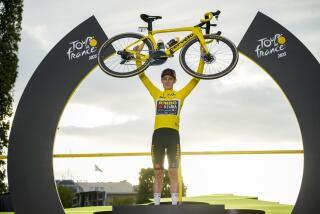Tour de Lance
PARIS — Lance Armstrong dominated last year’s Tour de France so completely that the race was over long before riders reached the finish.
Now, as the Texan prepares to bid for a fourth straight title, he has some news to make opponents tremble: He’s gotten even stronger.
“On balance, compared to 1999, 2000 and 2001, I feel better,” Armstrong said in an interview. “Anything can happen -- I can lose form, or have an accident. But I’m optimistic.”
The 30-year-old Armstrong, who astonished the world by coming back from cancer to win cycling’s toughest event three years ago, has good reason to be upbeat.
His main challenger, Jan Ullrich, won’t be making the Saturday start in Luxembourg. The German, who won in 1997 and finished second the last two years, was sidelined by a knee injury in May. And former champion Marco Pantani, mired in drug problems, will also be missing, leaving few serious threats for Armstrong.
Also, Armstrong probably knows the terrain of the three-week Tour better than anyone else competing.
“We’ve done all the mountain stages and all the time trials,” said the U.S. Postal Service rider, whose rivals concede his training schedule is extraordinarily demanding. “We’ve done some of the hard climbs twice.”
Armstrong began taming the French mountains in competition weeks ago, winning two warmup events--the Midi Libre in May and the Dauphine Libere in June.
On his way to claiming the second race, Armstrong rode up the Mont Ventoux, a highlight of this year’s Tour.
“It’s the hardest climb in France,” he said of the twisty mountain pass, which Tour riders will negotiate in the fierce July heat of the southern Provence region.
Armstrong conquered the same summit in the 2000 Tour but held off in the finishing stretch to let Pantani win the stage. He later called it a “gift,” although the Italian deemed it an insult.
Mont Ventoux is one of several climbs featured in this year’s Tour -- the shortest ever in terms of distance -- that Armstrong has made in the past.
In the exceptionally difficult 16th stage in the Alps, riders face the Col du Galibier mountain pass, where Armstrong claimed the win that signaled his full comeback from testicular cancer. The spectacular 1999 stage-victory came 2 1/2 years after he underwent brain surgery to remove the disease, which had also spread to his lungs.
The 16th stage between Les Deux-Alpes and La Plagne also takes riders over the Col de la Madeleine, where Armstrong last year bluffed rivals by feigning a loss of form. He grimaced in apparent pain, then suddenly sprinted up the next summit to open a huge lead over his startled rivals.
“Up until now, all I’ve done is train and race small events,” Armstrong said as he prepared for his title defense. “Maybe the Tour de France brings extra motivation.”
Maybe indeed. Armstrong is two wins shy of the Tour record of five titles, held jointly by Jacques Anquetil, Bernard Hinault, Eddy Merckx and Miguel Indurain. Only Spain’s Indurain won all five titles consecutively.
By taking this year’s race, Armstrong would surpass fellow American Greg LeMond’s three Tour titles and become the fourth rider to win the event four times in a row.
With Ullrich and Pantani out, Armstrong’s main rivals are likely to be Oscar Sevilla and Joseba Beloki of Spain and Colombia’s Santiago Botero. U.S. Postal teammate Roberto Heras is also a podium contender.
A French doping investigation into U.S. Postal will likely still be open when the Tour starts. But judicial officials say the 19-month inquiry has revealed no evidence of wrongdoing and is due to close by the end of the summer.
Armstrong, who has been plagued by suspicions of doping in France but has never failed a drug test, says he considers the issue “dead.”
“It is without merit and I will no longer pay attention to it,” he said on his Web site in June.
However, U.S. Postal recently walked into a new doping controversy by hiring Italian rider Giampaolo Mondini, then firing him when it learned he was being investigated as part of the drugs bust at the 2001 Giro d’Italia.
“We were most guilty of not researching the affair,” Armstrong said.
“We were completely surprised and of course we would never have hired him. When we discovered all the facts, it was clear what he would be let go.”
The Tour finishes July 28 on the Champs-Elysees in Paris.
More to Read
Sign up for Essential California
The most important California stories and recommendations in your inbox every morning.
You may occasionally receive promotional content from the Los Angeles Times.










